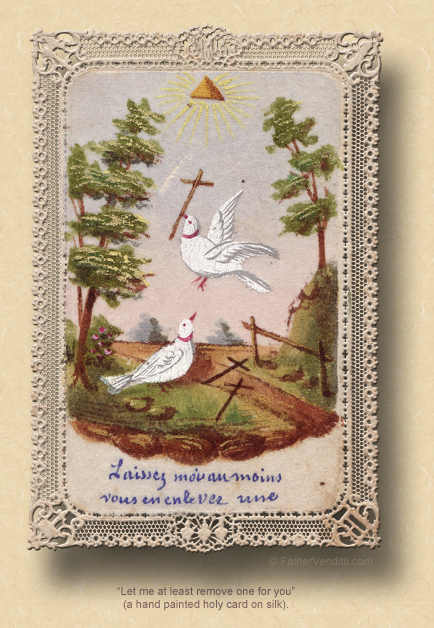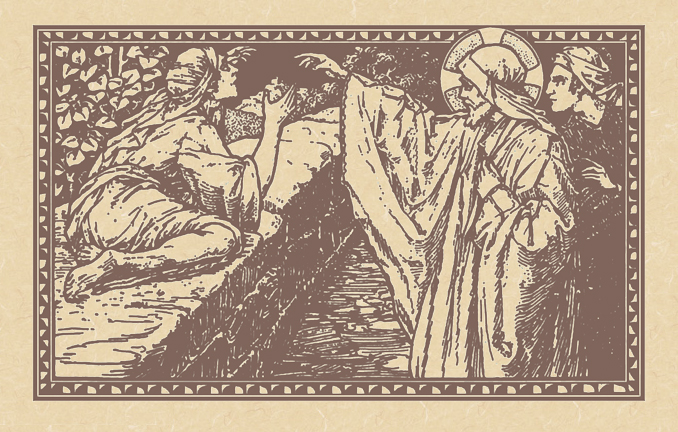We Don't Have to Be Perfect.
The Seventh Monday of Ordinary Time.
Lessons from the primary feria, according to the ordinary form of the Roman Rite:
• Sirach 1: 1-10.
• Psalm 93: 1-2, 5.
• Mark 9: 14-29.
Sexagesima Monday.*
Lessons from the dominica,** according to the extraordinary form of the Roman Rite:
• II Corinthians 11: 19-33; 12: 1-9.
• [Gradual] Psalm 82: 19, 14.
• [Tract] Psalm 59: 4, 6.
• Luke 8: 4-15.
FatherVenditti.com
|
 6:56 AM 2/25/2019 — This particular Gospel lesson has always fascinated me because of what it illustrates regarding the virtue of faith. When our Lord’s disciples ask Him why they couldn’t cast out the demon from the boy, and He replies that this particular kind of demon can only be cast out by means of prayer and fasting, most of us assume He’s speaking of something lacking in the approach taken by the disciples. But the disciples, as we’ve seen, have already been casting out demons in the name of our Lord. In reality, it was the boy’s father who was lacking in faith. Look at how the scene enfolds. 6:56 AM 2/25/2019 — This particular Gospel lesson has always fascinated me because of what it illustrates regarding the virtue of faith. When our Lord’s disciples ask Him why they couldn’t cast out the demon from the boy, and He replies that this particular kind of demon can only be cast out by means of prayer and fasting, most of us assume He’s speaking of something lacking in the approach taken by the disciples. But the disciples, as we’ve seen, have already been casting out demons in the name of our Lord. In reality, it was the boy’s father who was lacking in faith. Look at how the scene enfolds.
At first, the boy’s father comes to Christ with humility, but he vacillates, unsure of his ground; hence, his comment, “…if you can do anything, have compassion on us and help us” (Mark 9: 22 NABRE). It’s that qualifier that’s the problem: “…if you can do anything….” Our Lord’s response is, of course, one of the most consoling verses in all of Scripture: “Everything is possible to one who has faith” (v. 23 NABRE), the point being that this man didn’t have a complete faith. Nonetheless, he at least recognizes his lack of a perfect faith, and gives what is otherwise a correct response: “I do believe, help my unbelief!” (v. 24 NABRE).
If we’re honest with ourselves, that’s probably us. When things are going well, we truly believe our faith in Christ is solid and constant; but, when things go south, we have doubts. It’s part of our fallen nature. The question is: can we wrest ourselves away from that false perfectionism that isn’t able to cope with our own imperfections?
Those of you who know me well know that I’m a great devotee of Sherlock Holmes, and have even written a book about the subject. As part of my research, one of the books I consulted was the autobiography of Basil Rathbone, who played the Great Detective in fourteen feature-length films. He had divorced his first wife, and married his second wife, who was a Catholic; naturally, the marriage could not be recognized by the Church. In his autobiography, he addressed this subject, and expressed a profound admiration for the teaching of the Catholic Church, almost repeating word-for-word the statement of the father in today’s Gospel lesson. What struck me was the fact that he never attempted to disagree with the teaching of the Catholic Church,—of which he was not a member—but acknowledged that the Church’s teaching was founded on sound basis, and prayed to God for mercy.
I think that sometimes you and I are in that same situation. Sometimes, the best we can do is make an act of faith, and say to our Blessed Lord: “I do want to believe … please give me the grace to trust in You.”

* In the extraordinary form of the Roman Rite, the pre-Lenten season known as Septuagesima is observed, named after the first of the three weeks that comprise it; the following two weeks are Sexagesima and Quinquagesima. The purple of Lent is already worn, and the Gradual psalm is supplimented by an additional psalm called the Tract, with the Alleluia already suppressed. In English speaking countries, this season is sometimes called “Shrovetide,” because it ends on the Tuesday before Ash Wednesday, which is often called “Shove Tuesday.” A pre-Lenten season is preserved in every Christian Church that has a serious liturgical tradition, even the more traditional brands of the Anglican and Lutheran communions; in the Churches of the Byzantine Tradition, it's called the Triodion, and can be as long as four or five weeks depending on the date of Easter.
The pre-Lenten season was eliminated in the ordinary form of the Roman Rite during the reforms following the Second Vatican Council, making the ordinary from the only major liturgical tradition not to observe it in some way.
** In the extraordinary form, on ferias outside privileged seasons, the lessons come from the previous Sunday.
|

